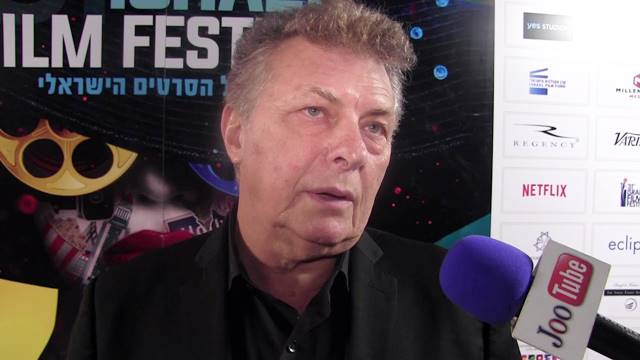
By Jae-Ha Kim
Hollywood Reporter
March 6, 2007
More than two decades ago, an Israeli rock star affectionately known to his fans as Poogy decided to create his own film festival. An avid lover of the arts and an actor himself, Poogy invested $35,000 of his own money into the venture and formed a fest designed to showcase the work of Israeli filmmakers. He was unsure of how film fans would react to his project, but he was certain that it was something he had to try.
“In my wildest dreams, I didn’t think my little festival would have much longevity,” says Meir Fenigstein, the artist formerly known as Poogy. “It was something I was passionate about, and luckily it turned out to be something that movie fans enjoyed, too.”
The largest event celebrating Israeli cinematic art and culture in the U.S., the Israel Film Festival has presented more than 700 feature films, documentaries, TV dramas and short films to more than 750,000 attendees since its launch and has honored the likes of Milos Forman, Sidney Lumet and Penny Marshall.
Now, Fenigstein is gearing up for the 22nd annual edition of Israel, which kicks off Wednesday at Grauman’s Chinese Theatre in Hollywood and will pay tribute to Sony Pictures Entertainment co-chairman Amy Pascal. The fest’s Los Angeles leg is set to run through March 22 before heading to Miami (April 26-May 3) and New York (June 6-21).
The fact that the event travels from city to city is a rarity on the festival circuit, but according to Pascal, that’s not the only thing that sets it apart. “The Israel Film Festival is a wonderful showcase for artists, as well as an opportunity for people to see beyond the headlines that are so often focused on conflict and strife,” she says. “This is a chance for those who appreciate cinema and art to go beyond politics and focus their attention on the brilliant and vibrant culture, lifestyle and talent that exists in Israel. Anytime we can celebrate film as the predominant art form of our times, I am thrilled.”
This year’s fest will include more than 30 projects, including documentaries, TV dramas and 11 feature films. Dror Shaul’s “Sweet Mud” — Israel’s official 2006 Oscar submission and the Grand Jury Prize winner at January’s Sundance Film Festival — is one of the event’s more high-profile features.
“It is never an easy task to sift through all the film entries,” says Rachael Shapiro, one of the festival’s program directors. “We’re not a large festival, so we only have room for 11 or 12 features each year. We get so many great films, but we have to exclude many, not because of quality, but because some of them deal with the same topic. We try to show as much diversity as we can with the movies we choose so that it’s compelling for everyone involved.”
Shapiro has noticed a gradual shift in the type of projects submitted, with films beginning to turn their focus away from war and politics and toward topical matters such as immigration or slice-of-life tales that could happen anywhere.
“Many of the movies we now see reflect society as it is today,” Shapiro says. “And as we get younger filmmakers, they offer different takes on life. Not everyone is the child of a Holocaust survivor anymore, so they are bringing their own experiences to their films that are different from what filmmakers were doing 20 or even 10 years ago.”
Adds David Libkind, head of productions and finance for the Tel Aviv-based Israel Film Fund, a longtime supporter of the Israel fest: “At the beginning, the films focused on Jews and emigrants from Israel. Over the last six years, Israeli films have made huge progress locally and internationally.”
Indeed, the pictures being showcased this year are strong on relationship dramas that eschew overt political statements. From the opening film “Aviva My Love,” which tells the story of a hard-working mother striving to pursue her dream of writing, to “Tied Hands,” a heart-wrenching profile of a mother fighting to save her ailing son, this year’s festival showcases women’s dreams, career aspirations and the struggle to raise their families — important issues for women worldwide.
Even the bittersweet “Sweet Mud,” about an emotionally unstable mother, shows the character’s resilience against all odds.
“The French have always done the best relationship pictures,” says producer Bernie Brillstein, one of this year’s festival co-chairmen. “The English have produced some wonderful films in that genre as well. But now, Israel seems to be coming of age. They are doing a beautiful job with their films, which show diversity, tolerance and understanding. It’s fantastic.”
Producing a film is always a challenge, but distributing it — especially to audiences outside Israel — can present an insurmountable obstacle for many Israeli filmmakers. This is where the Israel Film Festival plays a crucial role, according to Libkind.
“For this reason, many countries are allocating large amounts of money to help with the distribution of local films internationally,” he says. “Unfortunately, this is not the case with Israel. The country is not creating windows for the exploitation of films. Meir Fenigstein stepped into the place that was left empty by the country. His festival opens a window for Israeli filmmakers to show their work to American audiences.”
The festival wisely doesn’t try to compete with tentpole events such as Sundance, the Venice Film Festival or the Toronto International Film Festival. But there are many challenges facing smaller film festivals, including continuing to deliver compelling content to their audiences, satisfying sponsors and supporters and playing to the unique strengths that made them successful in the first place.
“That last point is very important for smaller festivals,” says Waco Hoover, president and co-founder of the International Film Festival Summit. “In this case, the fest takes place in three international cities in the United States that have large populations. (The event) showcases content that is, in large part, unavailable anywhere else. It is an event that offers a different cinematic experience with unique content, where the destination can be a draw and viewers can learn about new cultures and even world issues.”
Libkind points out that without the Israel Film Festival, a number of critically acclaimed films including 2002’s “Late Marriage,” 2004’s “Broken Wings” and 2005’s “Nina’s Tragedies” and “Walk on Water” would’ve gotten little attention outside of Israel.
“The Israel Film Festival is a great opportunity for Israeli filmmakers,” he says. “Many get to travel with their films, experience the audience’s response and get the opportunity to meet with American filmmakers and industry figures. The annual window that Meir is providing has a long-term effect on the Israeli film industry.”
The child of Holocaust survivors, Fenigstein grew up in Tel Aviv and made a name for himself as a musician before dabbling in acting. After moving from Israel to the U.S., he met an Israeli film professor who asked him to use his connections to help with the stateside launch of a couple of Israeli films, which would become the impetus for the creation of his film fest. During the fledgling version of the Israel Film Festival, he showed just six films to 3,000 people. A couple of years later, the audience doubled.
“I had no idea what I was doing, but I knew I wanted to do it,” Fenigstein recalls, laughing. “I used to get panic attacks and worry nonstop about what would happen if it failed and why I was doing something when I already had some success with music. I was not sure that this would work out for me. I was not sure if it would last one year, much less more than 20. But here I am, already worrying about next year’s festival.”





